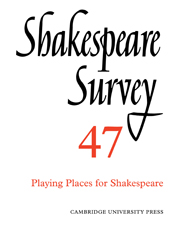Book contents
- Frontmatter
- Shakespeare Played Small: Three Speculations about the Body
- The Architecture of the Fortune Playhouse
- The Bare Island
- ‘How Chances it they Travel?’ Provincial Touring, Playing Places, and the King’s Men
- Writing for the Metropolis: Illegitimate Performances of Shakespeare in Early Nineteenth-Century London
- The Perishable Body of the Unpoetic: A. C. Bradley Performs Othello
- Playing Places for Shakespeare: The Maddermarket Theatre, Norwich
- ‘A Fairly Average Sort of Place’: Shakespeare in Northampton, 1927–1987
- The Living Monument: Self and Stage in the Criticism and Scholarship of M. C. Bradbrook
- Stratford Stages: Interviews with Michael Reardon and Tim Furby, and Sam Mendes
- Dis-Covering the Female Body: Erotic Exploration in Elizabethan Poetry
- Theseus’ Shadows in A Midsummer Night’s Dream
- ‘Time for Such a Word’: Verbal Echoing in Macbeth
- Shakespeare’s Knowledge of Italian
- Tamburline and Edward Alleyn’s Ring
- Shakespeare Performances in England, 1992–1993
- Professional Shakespeare Productions in the British Isles, January-December 1992
- The Year's Contributions to Shakespeare Studies 1 Critical Studies
- 2 Shakespeare’s Life, Times, and Stage
- 3 Editions and Textual Studies
- Books Received
- Index
‘Time for Such a Word’: Verbal Echoing in Macbeth
Published online by Cambridge University Press: 28 March 2007
- Frontmatter
- Shakespeare Played Small: Three Speculations about the Body
- The Architecture of the Fortune Playhouse
- The Bare Island
- ‘How Chances it they Travel?’ Provincial Touring, Playing Places, and the King’s Men
- Writing for the Metropolis: Illegitimate Performances of Shakespeare in Early Nineteenth-Century London
- The Perishable Body of the Unpoetic: A. C. Bradley Performs Othello
- Playing Places for Shakespeare: The Maddermarket Theatre, Norwich
- ‘A Fairly Average Sort of Place’: Shakespeare in Northampton, 1927–1987
- The Living Monument: Self and Stage in the Criticism and Scholarship of M. C. Bradbrook
- Stratford Stages: Interviews with Michael Reardon and Tim Furby, and Sam Mendes
- Dis-Covering the Female Body: Erotic Exploration in Elizabethan Poetry
- Theseus’ Shadows in A Midsummer Night’s Dream
- ‘Time for Such a Word’: Verbal Echoing in Macbeth
- Shakespeare’s Knowledge of Italian
- Tamburline and Edward Alleyn’s Ring
- Shakespeare Performances in England, 1992–1993
- Professional Shakespeare Productions in the British Isles, January-December 1992
- The Year's Contributions to Shakespeare Studies 1 Critical Studies
- 2 Shakespeare’s Life, Times, and Stage
- 3 Editions and Textual Studies
- Books Received
- Index
Summary
It is a critical commonplace that Macbeth’s opening line – ‘So foul and fair a day I have not seen’ (1.3.36), whatever its particular referents may be – ‘is singularly important to Macbeth’s character, echoing as it does the enigmatic and ominous chant of the Witches as they conclude their first appearance: ‘Fair is foul, and foul is fair’ (1.1.10). That the play begins with the witches strikingly adumbrates their immanent presence throughout the play; that they are the first to mention the name of the hero confirms their importance. The play and the character both will live under the shadow and the menace of these opening lines – the shortest first scene in the canon. The scene includes this gnomic utterance that destroys ‘the distinction [between] . . . foul and fair’; with it the Witches verbalize their position, standing for ‘those who have said “Evil, be thou my good.”’ Their contrasting adjectives occur often in proverbial contexts in English, but the paradox here suggested is unusual, though not unique, in the tradition. ‘Fair without but foul within’, says the proverb; the Witches say that fairness and foulness are the same, a point that Shakespeare had expressed with extraordinary foreshadowing in Love’s Labour’s Lost: “‘Fair” in “all hail” is foul, as I conceive’ (5.2.340).
By repeating the adjectives and reversing their sequence in the second half of the Witches' line, Shakespeare calls particular attention to these words, invests them with mystery, and fixes them in our minds so that when Macbeth speaks them just over one hundred lines later, his echo of the Witches' diction comes in with an eerie, secondary force (independently of the speaker's presumed intention).
- Type
- Chapter
- Information
- Shakespeare Survey , pp. 153 - 160Publisher: Cambridge University PressPrint publication year: 1994
- 2
- Cited by

